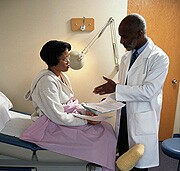
SUNDAY, March 3 (HealthDay News) — Five tests and procedures that obstetricians/gynecologists and their patients should question the need for are outlined in a list released by the American College of Obstetricians and Gynecologists (ACOG) as part of the Choosing Wisely campaign.
The American Board of Internal Medicine Foundation-led campaign involves about 35 medical specialty groups and is intended to encourage patients and doctors to discuss appropriate care while avoiding unnecessary tests and treatments. ACOG is one of 17 medical societies that recently released advice lists.
“We carefully selected the five procedures and tests in ob-gyn based on their potential to improve quality health care and avoid potential harm. As ob-gyns, our goal is to provide women the very best evidence-based medical care,” Dr. Hal Lawrence III, ACOG executive vice president, said in a college news release.
Here are the ACOG recommendations:
- Elective, non-medically indicated inductions of labor or cesarean deliveries should not be scheduled before 39 weeks’ gestation. Delivery prior to 39 weeks has been shown to be associated with an increased risk of learning disabilities and a potential increase in illness and death.
- Elective, non-medically indicated inductions of labor between 39 weeks’ and 41 weeks’ gestation should not be scheduled unless the cervix is deemed favorable.
- Routine annual Pap tests are not needed in women aged 30 to 65. In average-risk women, an annual screening offers no advantages over screening every three years.
- Treatment is not needed in average-risk women who have “mild dysplasia,” which is associated with the human papillomavirus (HPV), for a period of less than two years.
- For average-risk women with no symptoms, there is no need to screen for ovarian cancer. In these women, the potential harms of screening outweigh the potential benefits.
More information
Here’s where you can learn more about the Choosing Wisely campaign.

